When did MMA leadership become aware of COVID-19 and what actions were taken?
Mark Coté ’83, Acting Provost/Academic Dean, Professor of Engineering: I started hearing about the coronavirus in January, and we first started discussing it at leadership meetings in early February. Those talks increased in detail during February and included teleconferences during Spring Break, the first week of March. Once we returned to campus in March, the virus had made it to the U.S. and we began having daily meetings to address the potential impact on the campus.
On March 4, I asked all faculty to look at their classes and start preparations to move to remote instruction if required. We also asked that any required in-person assessments be moved forward in any class where that was possible.
When was the decision made to curtail in-person classes last semester?
Early in March, COVID was declared a pandemic by the World Health Organization. On the weekend of March 14, the first positive case was detected in Hancock County. Due to a lack of understanding at the time of how the virus spread and the fact that it could be asymptomatic in people for several days, we realized that the virus could be on our campus or in our local communities without us being able to detect it. This, combined with orders from the Governor and the closing of local K-12 schools, led President Brennan to decide on March 16 to close the campus to normal activities as of March 18.
What was the outcome?
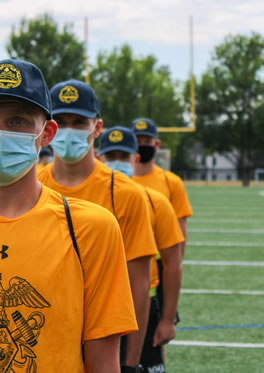 We provided several days for students to move out of student housing and embarked on a significant training program for faculty to transition their courses to a remote delivery model. Over the next two weeks, students moved home, and remote instruction resumed for all possible classes by March 30. The end of the spring term was pushed back to May 8, and we started the process of planning to make up courses that could not be completed remotely.
We provided several days for students to move out of student housing and embarked on a significant training program for faculty to transition their courses to a remote delivery model. Over the next two weeks, students moved home, and remote instruction resumed for all possible classes by March 30. The end of the spring term was pushed back to May 8, and we started the process of planning to make up courses that could not be completed remotely.
As we moved to remote instruction, the leadership team held multiple meetings each week to determine how MMA’s operations would adapt to the conditions of the pandemic. These discussions led to the cancellation of the summer training cruises on the Bowdoin and TS State of Maine and cancellation of the spring Commencement ceremony, and finally to the planning of Commencement via a virtual ceremony in June.
The facilities department and academic department chairs started the process of evaluating how the campus and our day-to-day work practices would have to change. Once a plan was developed, the first make-up labs for graduating seniors were completed on campus in late May, and the fall schedule, a return to a mixed-mode of instruction (face-to-face, hybrid, and remote) under the new safety protocols was announced.
A key tool in our return to campus was the collaboration with The Jackson Laboratory to develop COVID testing and screening protocols. We also developed a plan for baseline testing as people returned to campus, as well as surveillance testing during the fall semester, and for isolation and quarantine processes to handle positive cases. These tools, as well as the “12 Ways to 12 Weeks” program, put in place to remind everyone on the campus of good practices to prevent spreading the virus, have allowed us to resume instruction this fall.
What were some of the issues regarding U.S. Coast Guard exams that had to be resolved?
The immediate issue regarding U.S. Coast Guard (USCG) exams concerned the approximately 50 members of the class of 2020 who had expected to complete their summer training cruise and then take their exam at the Regional Examination Center (REC) in Boston. The Boston REC was closed in March, and with the summer training cruise canceled, these students could not obtain their license or graduate.
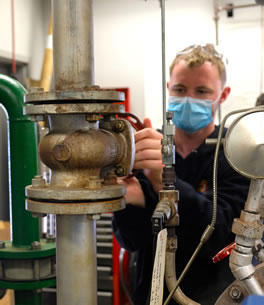
In late May, a student in the steam lab handles equipment in a make-up session.
To address this situation, and to obtain some vital information about how to conduct shipboard operations in a pandemic, we began planning for a pier-side cruise to give these students the sea time and course completion that they needed to finish their programs. We worked with the Coast Guard to approve this approach and obtained approval to train our engine cadets in a pier-side Fast Cruise [as in hold fast] in July and August on the State of Maine.
The approval was not granted for the deck students, but fortunately, the Maritime Administration offered several cadet billets for the transit of the Massachusetts Maritime Academy training ship Kennedy from its shipyard period in Mobile, Alabama to its home in Buzzard’s Bay, Massachusetts. Eleven deck cadets and one MMA faculty member completed that transit in June and July with cadets and faculty from three other maritime academies and crew.
Once both sea periods were completed, MMA arranged with the REC to host and conduct the USCG exams for our students in Castine in August. The students completing this exam were then able to graduate and start their careers.
We conducted a similar “Fast Cruise” on Bowdoin for students in August.
The Class of 2021, who would traditionally have taken their USCG exams in January of 2021, will now be delayed in taking the exams until after their rescheduled cruise on the State of Maine in April 2021. A second cruise is planned for July. Both cruises will be with the training ship at sea, although we may not have ports of call with visits ashore.
How was the major pivot to online learning instruction carried out?
Professor Susan Loomis, Dean of Faculty: We sought the help of faculty who were familiar with online learning to assist other faculty who were inexperienced with online learning, as were many students.
We worked with the IT department to provide training for faculty to use Canvas (an online learning management system) for course materials, testing, discussion boards, and communications. We also provided students and faculty with short courses to learn to use the system efficiently in our suddenly fully remote environment. Faculty Services Coordinator, Nicole Dyer, was designated as the Canvas assistant for faculty.
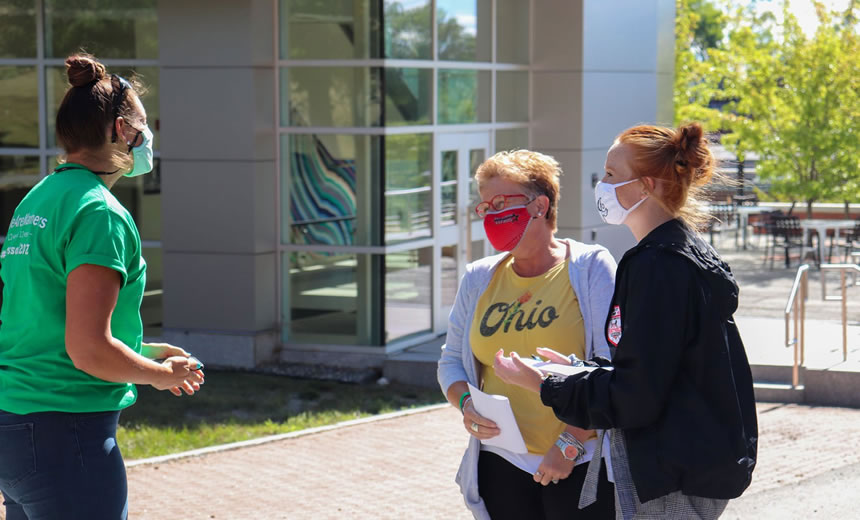
To prepare for the fall semester, teams of staff and faculty evaluated how to enhance the safety of classrooms and facilities across campus.
Once the semester ended in May, we organized two major groups of faculty and staff to determine how to reopen the campus for the fall semester safely and with allegiance to our academic standards. Jessica Muhlin and Rick Miller led those two teams with help from many faculty members and staff who provided expertise on safe classroom procedures and expertise on making adjustments to the academic schedules and calendars to assure all accreditation requirements were still met and USCG Standards of Training, Certification and Watchkeeping (STCW) were satisfied as best as possible.
Additional faculty and staff who worked hard on these elements included: Lisa Roy, Steve Tarrant, Kirk Langford, Joceline Boucher, Tom Batt, Lauren Gargani, Steve Cole, Nate Zmek ’15, Jennifer Norwood, Peter Stewart, and many others.
Teams worked throughout the summer to set up the Fast Cruise and then the reopening procedures and guidelines for safe facilities, safe classrooms, clear instructions regarding Canvas, training schedules, cruises, coops, internships, capstones, and consistent help sessions. All facets of the curriculum needed to be addressed: classroom lectures with attention to COVID spacing and especially lab procedures; use of the library, Buoy House tutoring plans, common area testing spaces.
Canvas training professionals were hired to provide courses for faculty to build their courses for the fall. Additional courses for students were provided online so they could find their way through each of their courses using Canvas.
Many students complained of not learning well apart from faculty, friends, and tutors. Independent learners did pretty well, but students who struggled need face to face support to see good learning results. Some students didn’t have help or support from home to stay motivated. Many involved will say that it takes much more work for the faculty and the students to provide remote learning for the same results.
Virtual graduation was held on June 6. What were the standout elements of the event?
Janet Acker, Chief of Staff and Executive Assistant to the President: When the campus closed down in March, many of the cyclical events we all cherish had to be re-invented. Commencement was one of them. How do you hold graduation during a pandemic? Not easily. But by putting together a last minute on-campus farewell and creating a virtual event for Graduation in June, we were able to offer the students and their families a chance for some closure after a college career that ended during one of the most challenging times in our nation’s history. While trying to provide our graduates with the pomp and circumstance of the traditional ceremony, it was also important to add more personal messaging since the event was going to be viewed on a screen. By having alumni, trustees, students, and faculty provide meaningful, relevant messages via video, we hope graduates were able to take away more meaning from the addresses than might otherwise have happened in a field house. The ceremony also included the traditional slide show and personal short messages of congratulations from faculty and staff. While not even close to a substitute for walking across a stage to the applause of friends and family, Commencement 2020 will be remembered.
2020 Commencement | June 6, 2020
How successful have graduates been finding jobs, and how did it go for co-op students in summer 2020?
Bryce Potter ’07, Director of Career Services and Cooperative Education: The class of 2020 has fared very well for having graduated in such a tumultuous time. 97% of those we have data for are employed, with 67% of the class responding.
Cadet shipping and co-ops were heavily impacted by COVID. These positions come from companies that value an MMA education. But the spring shutdowns occurred during the traditional hiring peak for most of them. Many opportunities disappeared, leaving us with the lowest placement rate in the past three decades across all programs by a margin of 40 percent. Consequently, next summer’s plan calls for placing 60% more students than is typical, and 30% more than we ever have. Only time will tell if those opportunities will be available, but companies are still hiring and we will be ready to put students out to work.
How was Regimental Preparatory Training adapted for fall 2020?
Lonnie Christian, Deputy Commandant: RPT was completed over 10 days in August. We had two days of check-in with two companies arriving on each day. This allowed for social distancing and accommodating small groups on campus. Additionally, our check-in plan required new students to be tested for COVID, which then allowed for training to be conducted in small groups. Once all the Midshipmen Under Guidance (MUGs) received a negative test result, we completed the RPT training schedule in groups of 8-10 person boat crews. Conducting the training in smaller groups was challenging for the strykers, but they got the job done.
How is the Regiment adapting?
This fall semester has been challenging for students and staff in many ways, but we are making progress and getting through the semester. We continue to take care of each other and build camaraderie and cohesion while conforming to health-protective measures. This means we can muster one company daily, which is the watch company. During that time midshipmen can interact with shipmates with whom they may not have any other opportunity during the academic day.
How has Athletics adjusted?
Steve Peed, Director of Athletics: We decided in consultation with leadership that we couldn’t safely compete reasonably on July 17. At that point, our focus became about how can we safely make athletics a meaningful experience for our students. That required a mindset shift, which isn’t always easy when you take away competition from competitive people.
Competition guidelines have been developed for each sport where appropriate. We have 14 different programs active, and not all sports are impacted the same way by restrictions. Golf is still golf, but with a mask. That’s not the case for sports where close contact is common.
The challenge has been finding ways to keep students engaged and not let drills become monotonous. We had to adapt to how we schedule increased practices with fewer people.
We approached the return to practice for the fall semester in phases according to the best guidance available to us. Most programs are now working in Phase III activities which makes everyone in that team’s bubble a close contact.
The most important work we are doing is providing a positive mental outlet for a third of an incredibly stressed student body.
Our students are seeing a full semester packed into 12 weeks. It is hard on them mentally.
So now it isn’t about the excitement of chasing a championship, but more about getting out and getting after it for a 60, 90, or 120 session and an escape into their passion. It’s a connection with teammates after a day of classes and Zooms.
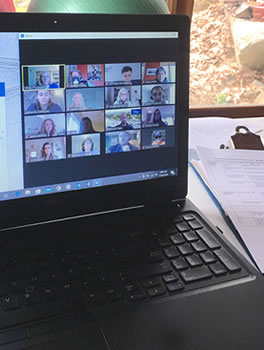
Most MMA classes went online in late spring. Here, Ocean Studies seniors present their research proposals.
How were fall classes offered?
Amy Gutow, Registrar: There were 543 course sections offered for fall 2020. Of those, 325, or about 60 percent, were in-person instruction and some 28 percent were online only. About 40 percent of all courses offered some level of online instruction.
How are students doing academically this semester?
Joceline Boucher, Accessibility Services Director: Students in general seem to be struggling more this fall, which may explain the academic alert and grade data I’m seeing. Faculty send academic alerts to students who perform poorly in their courses. As of the beginning of November, Academy faculty have already sent more alerts to students than they did in all of fall 2019. Initial grade data are also concerning. All new students receive mid-semester grades, and their grade point averages so far are lower than in previous years.
What is the vibe on campus the first week of November with finals approaching?
Roxanna MacGregor, Class of 2023, International Business and Logistics, SGA President: This semester is challenging in ways I would not have expected. I see many students are being pushed to keep on top of things, and I’m pleased and surprised by how far we’ve made it into such a crazy semester!
It has been amazing to watch our community come together to do the things that are allowing us to still be here.
Students, staff and faculty are determined to see this semester through. This is a resilient community.
Thomas Batt, Professor and Chair, Arts & Sciences Department: It’s hard to tease out the many factors that contribute to the mood on campus, which I would describe as sober and anxious. Certainly, COVID is the ultimate source of all these factors, but to what degree are students affected by the accelerated semester, the mix of course-delivery modes they’re experiencing, the absence of sports and jaunts off campus, and the diminished contact with other human beings?
I will say that students, staff and faculty alike are determined to see this semester through. I see no panic, no surrender, no finger-pointing or infighting. This is a resilient community.
What has contributed most to MMA’s success so far in facing the pandemic?
Mark Coté: The biggest contributor has been everyone’s willingness to take this problem seriously, to be flexible in the daily challenges that arise, and to adapt their actions and activities in concert with the restrictions that have been imposed. While everyone wants to get “back to normal” as soon as possible, they all understand we have to operate in a different mode for now if we want to continue to provide our students with the education and skills that they want and require for their careers.█
Photos: Andrew Todd, Billy Sims, Emily Baer
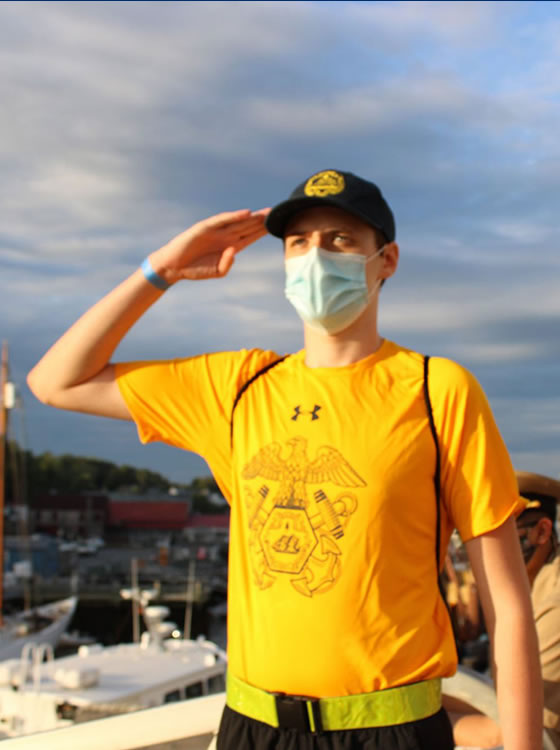
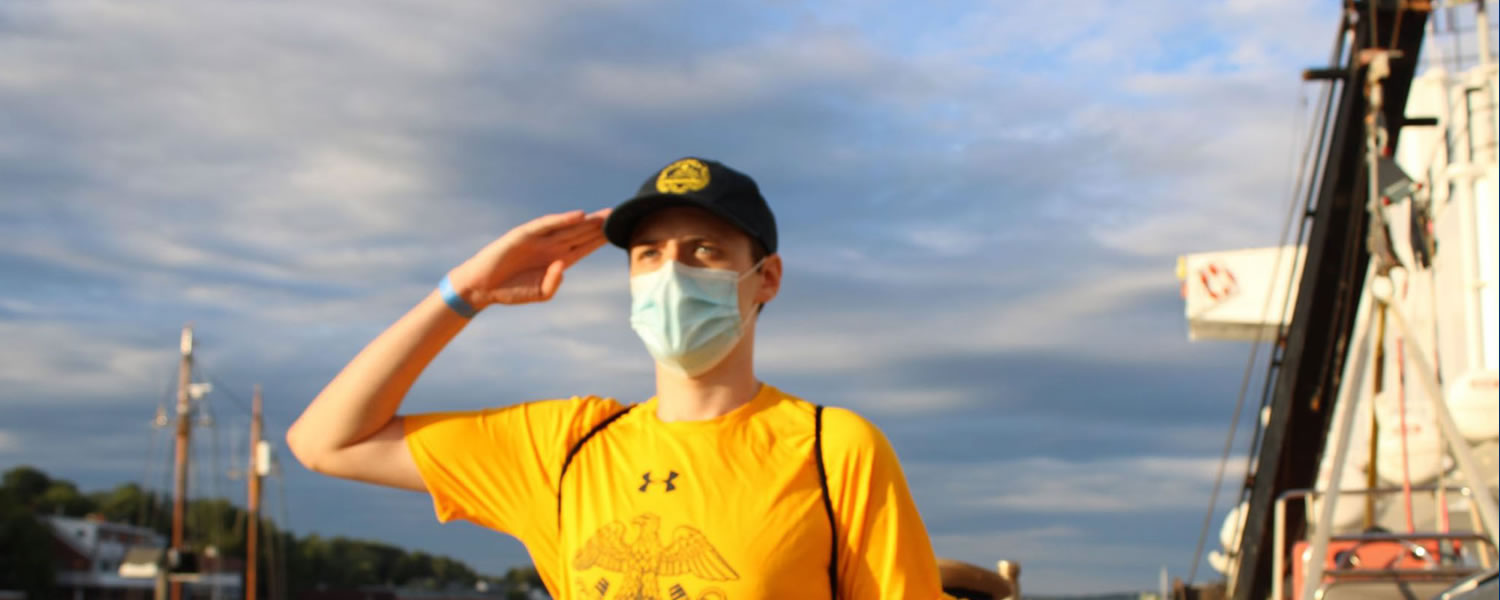



Post Comment
Comments are moderated and will be reviewed prior to posting online. Please be aware that when you submit a comment, you agree to the following rules:
Maine Maritime Academy reserves the right to delete any comment that does not comply with these guidelines and is not responsible or liable in any way for comments posted by its users. If you have a message for the editor, please email mariner@mma.edu.
Features
View All >Read More
Read More
Read More
Castine, Maine 04420All Rights Reserved © 2025
Privacy Policy & Terms
Web issue? Contact Webmaster